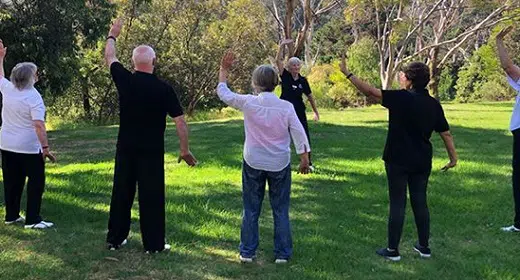by Jenny Harrison: Many people have described learning tai chi as ‘a journey’…
And like all journeys, it begins with the first step. New students are often surprised to discover that tai chi is far much more than simply ‘waving arms through the air’ as they explore and develop diverse physical and cognitive skills through the constant, patient practice of this ancient art.
When you join a Beginners tai chi class, your instructor will gently guide you through a series of experiences that will lead to a gradual and evolving understanding of the principles of movement and a broadening of your thought processes.
From a learning perspective, the 4 Stages of Competency may help to explain the different emotions and developing skills we experience when tackling a new skill.
- We begin our tai chi journey in a state of ‘unconscious incompetence’. This means we don’t know what we don’t know – and we don’t realise what is involved in learning something new.
- This blissful feeling of ignorance is quickly replaced by ‘conscious incompetence’. We can complete some exercises, but with great concentration, frustration…and many mistakes. We understand the physical requirements but as yet, we can’t marry these skills with the notion of mindfulness or meditation. This stage may last many years, and it is the period of greatest development in physical skills as well as emotional and cognitive awareness.
- The third stage, ‘conscious competence’, is where we feel more comfortable with our skills while acknowledging and appreciating the technical and philosophical intricacies and subtleties of tai chi. And because we feel comfortable and confident in our abilities, we are open to more complex principles of movement. We want to learn more and advance our skills and understanding.
- The fourth stage, ‘unconscious competence’, allows our practice to combine the physical, mental and emotional aspects of tai chi into a ‘standing meditation’ sequence of soft, flowing and harmonious physical movements blended with mental relaxation and mindfulness. Each and every tai chi student takes a different path along the tai chi journey. Some like to take it step by step, while others want to view the whole before they can break the journey into manageable and attainable destinations.
Some may linger a little longer at one place, then continue onto another. Most students encounter small hurdles along the way that make the journey difficult, but even more satisfying once these obstacles have been navigated successfully.
As your tai chi instructor guides you through the 4 Stages of Competency you will begin to feel a range of physical and mental benefits. My students often describe a heightened body awareness, improved posture, better coordination and leg strength. Their breathing becomes more relaxed and effective.
Mentally, they feel more relaxed, mindful, patient, and confident. Cognitively, they report improved memory, recall and flexibility of thought.
As a student starting out along your personal tai chi journey, you may experience additional benefits, understandings and discoveries.
These could include:
• Joy of learning
• Growing awareness of those around you
• Understanding of Yin and Yang forces
• Acceptance of change
• Becoming mindful and enjoying the sense of ‘being in the moment’
• Becoming more patient and tolerant with yourself and those around you
• Letting go of a focus on ‘self’
• Sense of calm and peace









































